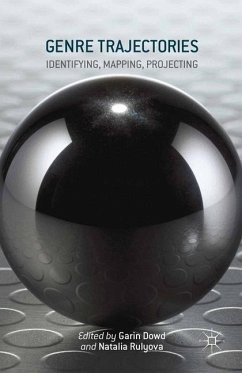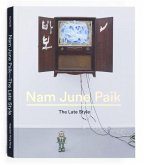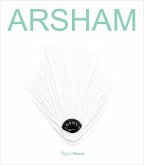Genre Trajectories
Identifying, Mapping, Projecting
Herausgegeben von Dowd, Garin; Rulyova, Natalia
Genre Trajectories
Identifying, Mapping, Projecting
Herausgegeben von Dowd, Garin; Rulyova, Natalia
- Broschiertes Buch
- Merkliste
- Auf die Merkliste
- Bewerten Bewerten
- Teilen
- Produkt teilen
- Produkterinnerung
- Produkterinnerung
This book provides a fresh interdisciplinary perspective on genre and identifies developments in genre studies in the early 21st century. Genre approaches are applied to examine a fascinating range of texts including ancient Greek poems, Holocaust visual and literary texts, contemporary Hollywood films, selfies, melodrama, and classroom practices.
Andere Kunden interessierten sich auch für
![Nam June Paik: The Late Style Nam June Paik: The Late Style]() Nam June Paik: The Late Style77,99 €
Nam June Paik: The Late Style77,99 €![Todd Jay Weinstein Todd Jay Weinstein]() Todd Jay Weinstein22,99 €
Todd Jay Weinstein22,99 €![Anders Zorn Anders Zorn]() Johan CederlundAnders Zorn48,99 €
Johan CederlundAnders Zorn48,99 €![Pornographic Art and the Aesthetics of Pornography Pornographic Art and the Aesthetics of Pornography]() Pornographic Art and the Aesthetics of Pornography75,99 €
Pornographic Art and the Aesthetics of Pornography75,99 €![We Are Friendswithyou We Are Friendswithyou]() FriendsWithYouWe Are Friendswithyou42,99 €
FriendsWithYouWe Are Friendswithyou42,99 €![Architecture of Survival Architecture of Survival]() Architecture of Survival34,00 €
Architecture of Survival34,00 €![Daniel Arsham Daniel Arsham]() Virgil AblohDaniel Arsham51,99 €
Virgil AblohDaniel Arsham51,99 €-
-
This book provides a fresh interdisciplinary perspective on genre and identifies developments in genre studies in the early 21st century. Genre approaches are applied to examine a fascinating range of texts including ancient Greek poems, Holocaust visual and literary texts, contemporary Hollywood films, selfies, melodrama, and classroom practices.
Produktdetails
- Produktdetails
- Verlag: Macmillan Education / Palgrave Macmillan UK / Springer Palgrave Macmillan
- Artikelnr. des Verlages: 978-1-349-56173-5
- 1st ed. 2015
- Seitenzahl: 268
- Erscheinungstermin: 5. Dezember 2017
- Englisch
- Abmessung: 216mm x 140mm x 15mm
- Gewicht: 342g
- ISBN-13: 9781349561735
- ISBN-10: 1349561738
- Artikelnr.: 45080559
- Herstellerkennzeichnung
- Macmillan Education
- Tiergartenstr. 17
- 69121 Heidelberg
- ProductSafety@springernature.com
- Verlag: Macmillan Education / Palgrave Macmillan UK / Springer Palgrave Macmillan
- Artikelnr. des Verlages: 978-1-349-56173-5
- 1st ed. 2015
- Seitenzahl: 268
- Erscheinungstermin: 5. Dezember 2017
- Englisch
- Abmessung: 216mm x 140mm x 15mm
- Gewicht: 342g
- ISBN-13: 9781349561735
- ISBN-10: 1349561738
- Artikelnr.: 45080559
- Herstellerkennzeichnung
- Macmillan Education
- Tiergartenstr. 17
- 69121 Heidelberg
- ProductSafety@springernature.com
Natasha Artemeva, Carleton University, Canada Peter Buse, Kingston University, London, UK Béatrice Damamme-Gilbert, University of Birmingham, UK Katya Krylova, University of Nottingham, UK Donald N. Myles, Carleton University, Canada Timothy S. Murphy, Oklahoma State University, USA Sarah Parker, University of Stirling, UK Anne Smedegaard, University of Copenhagen, Denmark Erin K. Stapleton, University of Melbourne, Australia Lesley Stevenson, Independent Scholar Michael Stewart, Queen Margaret University, Edinburgh, UK Michael Volek, Athabasca University, Canada
PART I: RE-ASSESSING THEORETICAL TRADITIONS: FROM ANCIENT GREECE TO BAKHTIN
1. Philosophy ' 's Broken Mirror: Genre Theory and the Strange Place of Poetry from Plato to Badiou; Garin Dowd
2. Remembering to Forget: the Role of Time, Space and Memory in Mikhail Bakhtin ' 's Treatment of Language; Michael Volek
PART II: MEMORY, TESTIMONY, POLITICS
3. The Question of Genre in Holocaust Narrative: The Case of Patrick Modiano ' 's Dora Bruder (1997); Béatrice Damamme-Gilbert
4. Genre and Memory in Margareta Heinrich ' 's and Eduard Erne ' 's Totschweigen (1994) and Elfriede Jelinek ' 's Rechnitz (Der Würgeengel) (2008); Katya Krylova
PART III: REVISITING LITERARY GENRES: WRITING BACK/WRITING FORWARD
5. The Muse Writes Back: Lyric Poetry and Female Poetic Identity; Sarah Parker
6. How (Not) to Translate an Unidentified Narrative Object or a New Italian Epic; Timothy S. Murphy
PART IV: VISUAL CULTURES: TECHNOLOGIES, INSTITUTIONS AND GENRES
7. Seduced by Art: the Problem of Photography; Lesley Stevenson
8. Vernacular Photographic Genres after the Camera Phone; Peter Buse
PART V: FILM GENRES: ENDURANCE AND TRANSFORMATION
9. The Enduring Reach of Melodrama in Contemporary Film and Culture; Michael Stewart
10. Objects after Adolescence: Teen Film with Transition in Spring Breakers and The Bling Ring; Erin K. Stapleton
PART VI: PEDAGOGIES: APPLICATIONS IN EDUCATION
11. Student and Teacher Constructions of the ' 'Generic Contract ' ' in High School Essays; Anne Smedegaard
12. Perceptions of Prior Genre Knowledge: A Case of Incipient Biliterate Writers in the EAP Classroom; Natasha Artemeva and Donald N. Myles
1. Philosophy ' 's Broken Mirror: Genre Theory and the Strange Place of Poetry from Plato to Badiou; Garin Dowd
2. Remembering to Forget: the Role of Time, Space and Memory in Mikhail Bakhtin ' 's Treatment of Language; Michael Volek
PART II: MEMORY, TESTIMONY, POLITICS
3. The Question of Genre in Holocaust Narrative: The Case of Patrick Modiano ' 's Dora Bruder (1997); Béatrice Damamme-Gilbert
4. Genre and Memory in Margareta Heinrich ' 's and Eduard Erne ' 's Totschweigen (1994) and Elfriede Jelinek ' 's Rechnitz (Der Würgeengel) (2008); Katya Krylova
PART III: REVISITING LITERARY GENRES: WRITING BACK/WRITING FORWARD
5. The Muse Writes Back: Lyric Poetry and Female Poetic Identity; Sarah Parker
6. How (Not) to Translate an Unidentified Narrative Object or a New Italian Epic; Timothy S. Murphy
PART IV: VISUAL CULTURES: TECHNOLOGIES, INSTITUTIONS AND GENRES
7. Seduced by Art: the Problem of Photography; Lesley Stevenson
8. Vernacular Photographic Genres after the Camera Phone; Peter Buse
PART V: FILM GENRES: ENDURANCE AND TRANSFORMATION
9. The Enduring Reach of Melodrama in Contemporary Film and Culture; Michael Stewart
10. Objects after Adolescence: Teen Film with Transition in Spring Breakers and The Bling Ring; Erin K. Stapleton
PART VI: PEDAGOGIES: APPLICATIONS IN EDUCATION
11. Student and Teacher Constructions of the ' 'Generic Contract ' ' in High School Essays; Anne Smedegaard
12. Perceptions of Prior Genre Knowledge: A Case of Incipient Biliterate Writers in the EAP Classroom; Natasha Artemeva and Donald N. Myles
PART I: RE-ASSESSING THEORETICAL TRADITIONS: FROM ANCIENT GREECE TO BAKHTIN
1. Philosophy ' 's Broken Mirror: Genre Theory and the Strange Place of Poetry from Plato to Badiou; Garin Dowd
2. Remembering to Forget: the Role of Time, Space and Memory in Mikhail Bakhtin ' 's Treatment of Language; Michael Volek
PART II: MEMORY, TESTIMONY, POLITICS
3. The Question of Genre in Holocaust Narrative: The Case of Patrick Modiano ' 's Dora Bruder (1997); Béatrice Damamme-Gilbert
4. Genre and Memory in Margareta Heinrich ' 's and Eduard Erne ' 's Totschweigen (1994) and Elfriede Jelinek ' 's Rechnitz (Der Würgeengel) (2008); Katya Krylova
PART III: REVISITING LITERARY GENRES: WRITING BACK/WRITING FORWARD
5. The Muse Writes Back: Lyric Poetry and Female Poetic Identity; Sarah Parker
6. How (Not) to Translate an Unidentified Narrative Object or a New Italian Epic; Timothy S. Murphy
PART IV: VISUAL CULTURES: TECHNOLOGIES, INSTITUTIONS AND GENRES
7. Seduced by Art: the Problem of Photography; Lesley Stevenson
8. Vernacular Photographic Genres after the Camera Phone; Peter Buse
PART V: FILM GENRES: ENDURANCE AND TRANSFORMATION
9. The Enduring Reach of Melodrama in Contemporary Film and Culture; Michael Stewart
10. Objects after Adolescence: Teen Film with Transition in Spring Breakers and The Bling Ring; Erin K. Stapleton
PART VI: PEDAGOGIES: APPLICATIONS IN EDUCATION
11. Student and Teacher Constructions of the ' 'Generic Contract ' ' in High School Essays; Anne Smedegaard
12. Perceptions of Prior Genre Knowledge: A Case of Incipient Biliterate Writers in the EAP Classroom; Natasha Artemeva and Donald N. Myles
1. Philosophy ' 's Broken Mirror: Genre Theory and the Strange Place of Poetry from Plato to Badiou; Garin Dowd
2. Remembering to Forget: the Role of Time, Space and Memory in Mikhail Bakhtin ' 's Treatment of Language; Michael Volek
PART II: MEMORY, TESTIMONY, POLITICS
3. The Question of Genre in Holocaust Narrative: The Case of Patrick Modiano ' 's Dora Bruder (1997); Béatrice Damamme-Gilbert
4. Genre and Memory in Margareta Heinrich ' 's and Eduard Erne ' 's Totschweigen (1994) and Elfriede Jelinek ' 's Rechnitz (Der Würgeengel) (2008); Katya Krylova
PART III: REVISITING LITERARY GENRES: WRITING BACK/WRITING FORWARD
5. The Muse Writes Back: Lyric Poetry and Female Poetic Identity; Sarah Parker
6. How (Not) to Translate an Unidentified Narrative Object or a New Italian Epic; Timothy S. Murphy
PART IV: VISUAL CULTURES: TECHNOLOGIES, INSTITUTIONS AND GENRES
7. Seduced by Art: the Problem of Photography; Lesley Stevenson
8. Vernacular Photographic Genres after the Camera Phone; Peter Buse
PART V: FILM GENRES: ENDURANCE AND TRANSFORMATION
9. The Enduring Reach of Melodrama in Contemporary Film and Culture; Michael Stewart
10. Objects after Adolescence: Teen Film with Transition in Spring Breakers and The Bling Ring; Erin K. Stapleton
PART VI: PEDAGOGIES: APPLICATIONS IN EDUCATION
11. Student and Teacher Constructions of the ' 'Generic Contract ' ' in High School Essays; Anne Smedegaard
12. Perceptions of Prior Genre Knowledge: A Case of Incipient Biliterate Writers in the EAP Classroom; Natasha Artemeva and Donald N. Myles








